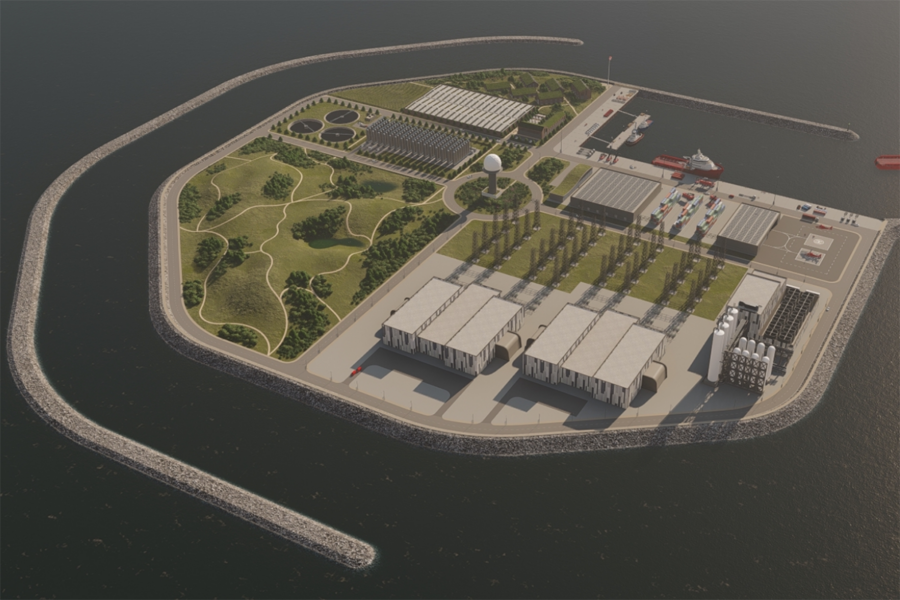A massive international ‘energy island’ in the North Sea surrounded by huge wind farms could be built before 2030.
The UK energy company National Grid has confirmed it is in talks with other unnamed interests about helping to build the proposed artificial island.
The scheme would involve significantly larger offshore wind farms than existing ones, which would be connected to underwater cables that would direct the energy to participating countries, reported the Guardian.
National Grid is a key developer of long-distance cables, including the recent completion of the world’s longest undersea power cable between the UK and Norway.
“We are in tripartite discussions over an energy island that the UK would likely connect to,” Nicola Medalova, National Grid’s managing director of interconnectors, told New Scientist. She declined to name the two other parties in the talks. A National Grid spokesperson confirmed talks are taking place, but said they were not tripartite.
Nicola Medalova said the energy island could combine wind and hydrogen power generation as well as battery storage capacity, and could be connected to more than one country. She said it could be built as soon as 2030.
She expected that all new interconnectors would be hybrid, with the ability to connect to offshore wind farms, and there was an expectation for wind farm developers and interconnector companies to take a ‘collaborative sharing approach’ to take pressure off coastal communities.
Other energy network operators that have shown an interest in creating energy islands in the North Sea include TenneT in the Netherlands and Elia in Belgium.
An Elia spokesperson confirmed to the Guardian that it was developing an additional interconnector with the UK, called the Nautilus project, and that Belgium planned to build an energy island, but added: “Whether Nautilus will be connected to the Belgian energy island is currently uncertain. That is part of the studies that are currently underway.”
A spokesperson for TenneT said it was open to talks like this, but could not confirm that any had taken place.
Meanwhile, the Danish Energy Agency is planning to build energy islands in the North and Baltic seas. The Danish government committed in February to taking a majority stake in a £25bn artificial energy island 50 miles offshore in the North Sea.
Professor Neil Strachan, director of the UCL Energy Institute, said the UK’s potential involvement in an energy island was ‘super exciting’, and was much needed to meet low-carbon energy goals. But he said such a project was likely to cost tens of billions, and suggested to the Guardian that it would need public underwriting because it was ‘really, really huge’.
Careful implementation, such as no-fishing zones, would be required to ensure minimal damage to the marine ecosystem, he added.
The UK has so far installed nearly 10 gigawatts of wind power capacity, which is sufficient to power about seven million homes, and has the world’s largest offshore wind energy market.
Dale Rodmell, assistant chief executive of the NFFO, said: “The prospect of offshore energy islands is a double-edged sword for the fishing industry. On the one hand they represent yet more potential take of fishing grounds.
“But on the other, if it means a rationalisation of electricity infrastructure in the face of a massive expansion in offshore wind, they may also limit the amount of cabling in the seas, by avoiding multiple offshore-wind- to-land connections, that could conflict with fishing.
“Location, as always, will be key. The suggestion that the Dogger Bank could be host to one would come as a bitter irony to the fishing industry, given MMO proposals to ban bottom-towed gears from the whole area.
“It further highlights the ongoing failure in marine planning policy to effectively rationalise the needs of the fishing industry and the rest of the blue economy, whilst locating conservation measures in the most suitable places.”
The energy island project would be a major step in the push towards a huge expansion of offshore wind capacity and Boris Johnson’s recently announced plan to eliminate fossil fuels from UK electricity generation by 2035.
A spokesperson for the Department for Business, Energy and Industrial Strategy said: “Interconnectors will play a significant role in reducing people’s energy bills, further securing our energy supply and helping decarbonise the UK power system by 2035.
“Our exposure to volatile global gas prices underscores the importance of building a strong, home-grown renewables sector so we can protect consumers into the future from gas prices set by international markets. As such, we are committed to working with developers and our European partners to increase our interconnection capacity and help connect huge volumes of offshore wind in the North Sea.”
This story was taken from the latest issue of Fishing News. For more up-to-date and in-depth reports on the UK and Irish commercial fishing sector, subscribe to Fishing News here or buy the latest single issue for just £3.30 here.








